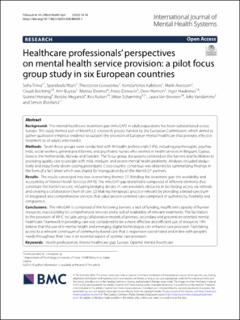Healthcare professionals’ perspectives on mental health service provision: a pilot focus group study in six European countries
Triliva, Sofia; Ntani, Spyridoula; Giovazolias, Theodoros; Kafetsios, Konstantinos; Axelsson, Malin; Bockting, Claudi; Buysse, Ann; Desmet, Mattias; Dewaele, Alexis; Hannon, Dewi; Haukenes, Inger; Hensing, Gunnel; Meganck, Reitske; Rutten, Kris; Schønning, Viktor; Van Beveren, Laura; Vandamme, Joke; Øverland, Simon Nygaard
Journal article, Peer reviewed
Published version

Åpne
Permanent lenke
https://hdl.handle.net/11250/2739508Utgivelsesdato
2020Metadata
Vis full innførselSamlinger
Originalversjon
International Journal of Mental Health Systems. 2020, 14:16 https://doi.org/10.1186/s13033-020-00350-1Sammendrag
Background
The mental healthcare treatment gap (mhcGAP) in adult populations has been substantiated across Europe. This study formed part of MentALLY, a research project funded by the European Commission, which aimed to gather qualitative empirical evidence to support the provision of European mental healthcare that provides effective treatment to all adults who need it.
Methods
Seven focus groups were conducted with 49 health professionals (HPs), including psychologists, psychiatrists, social workers, general practitioners, and psychiatric nurses who worked in health services in Belgium, Cyprus, Greece, the Netherlands, Norway and Sweden. The focus group discussions centered on the barriers and facilitators to providing quality care to people with mild, medium, and severe mental health problems. Analyses included deductively and inductively driven coding procedures. Cross-country consensus was obtained by summarizing findings in the form of a fact sheet which was shared for triangulation by all the MentALLY partners.
Results
The results converged into two overarching themes: (1) Minding the treatment gap: the availability and accessibility of Mental Health Services (MHS). The mhcGAP gap identified is composed of different elements that constitute the barriers to care, including bridging divides in care provision, obstacles in facilitating access via referrals and creating a collaborative ‘chain of care’. (2) Making therapeutic practice relevant by providing a broad-spectrum of integrated and comprehensive services that value person-centered care comprised of authenticity, flexibility and congruence.
Conclusions
The mhcGAP is comprised of the following barriers: a lack of funding, insufficient capacity of human resources, inaccessibility to comprehensive services and a lack of availability of relevant treatments. The facilitators to the provision of MHC include using collaborative models of primary, secondary and prevention-oriented mental healthcare. Teamwork in providing care was considered to be a more effective and efficient use of resources. HPs believe that the use of e-mental health and emerging digital technologies can enhance care provision. Facilitating access to a relevant continuum of community-based care that is responsive coordinated and in line with people’s needs throughout their lives is an essential aspect of optimal care provision.
